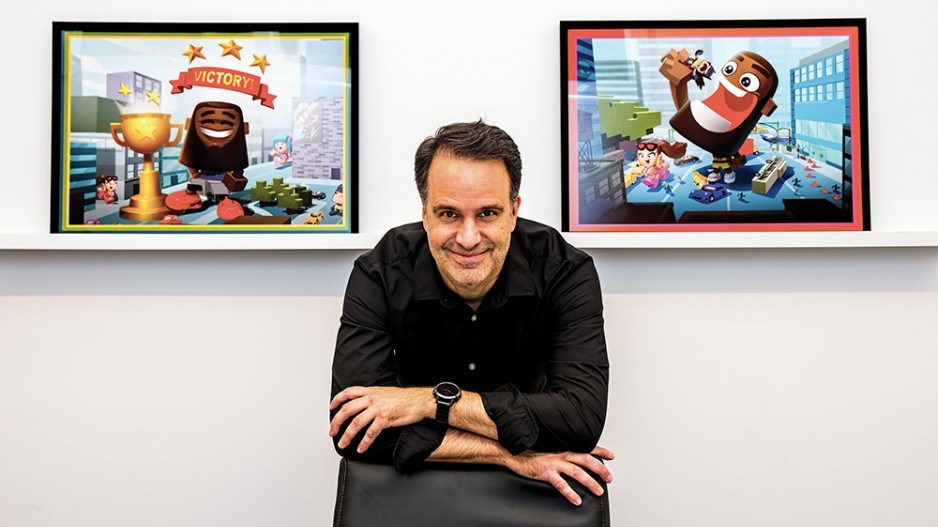The future prosperity of B.C.’s video game industry will depend on how the sector seizes opportunities arising during drastic changes created by the COVID-19 pandemic.
That is the observation of Sun Machine Games co-founder and CEO Wil Mozell – one of Vancouver’s most seasoned industry leaders over the last three decades and a major player in the growth of both Microsoft Corp. (Nasdaq:MSFT) and Electronic Arts (Nasdaq:EA) in the Lower Mainland.
Mozell, who launched startup mobile game studio Sun Machine last year, said a major part of Vancouver’s success in expanding the industry over the last decade has stemmed from U.S. tech giants like Microsoft, Amazon.com Inc. (Nasdaq:AMZN) and Facebook Inc. (Nasdaq:FB) facing difficulty in getting U.S. visas for qualified tech talent from all over the world.
“There’s only so much talent in any one given country,” Mozell said. “So the pitch in Vancouver in the last few years has been to use the Cascadia corridor, with teams in Vancouver that work with companies based in Seattle or elsewhere.… The issue in the U.S. has always been the visa, and I’ve rarely seen an issue with visas here in Canada in terms of the visas available.”
However, the pandemic is changing that equation. Tech employees – no longer required to work in an office – have more flexibility in choosing where their home base will be. That could mean that the number of game studio employees physically present in the Lower Mainland will drop significantly as staff members choose to work remotely.
“When I was with EA, it was the largest game studio in the world, and if you wanted to work with EA, you came to Vancouver,” Mozell said of his time at the gaming giant, where the number of employees grew to 1,800 from 110 over 13 years in the late 1990s and early 2000s. “In the future, the company will come to the talent. We [Sun Machine] just hired a new head engineer based in Montreal, and if that person wants to move to Vancouver, great. But if that person wants to stay in Montreal, we will build a team around them.”
Where does that leave Vancouver’s gaming industry?
Mozell, who also co-founded Vancouver’s BigPark gaming studio in 2007 before selling the company to Microsoft in 2009 and expanding the operations from a team of 50 to almost 500 workers by 2015, said the key will be for the city to take advantage of its strengths in the tech sector.
That means companies in Vancouver have to be flexible in allowing people they hire to choose their work locations, while focusing efforts on efficiently combining components of a project into a cohesive end product for consumers – a “leadership role in putting things together in new ways from new perspectives,” Mozell said.
As examples of Vancouver’s innovation prowess, Mozell noted BigPark’s work on the Kinect motion sensor on Microsoft’s Xbox One gaming consoles in the early 2010s and independent local studios like East Side Games being recognized on PocketGamer.biz’s Top 50 Mobile Game Makers of 2020 list in August.
“The industry is mature now that you can find talent in many, many places,” he said. “We can start a team in Florida if we wanted to; but the HQ is here. And the HQ needs to be here in Vancouver, because it’s a place that even today is seen as having enormous leadership and capability linked to that leadership in technology, creative, and production.
“We are at a time, when you talk about Vancouver, where there are still companies growing. And what I mean by growth is not growing projects or opportunities, but physical butts in seats. I remember a time in the industry when people judged your success based on the number of people on your team, but that’s not the case anymore. If a company said then that they had 150 people, I’d say they were killing it. But now, if a company said it has 350 people, I’d say that’s kind of scary because of the costs involved.”
That’s a model that has fit the profile of Sun Machine, which successfully launched its first product – mobile free-to-play battle-royale game Go BIG! – on June 12 within the Canadian market.
Sun Machine plans to make the game available worldwide on iOS and Google Play by the end of this year.
Sun Machine is also benefiting from Mozell’s focus on flexibility. The developer’s studio in east Vancouver has a capacity of just under 30 people. Mozell initially had fears that the startup – currently with 20 staff – would quickly outgrow the space.
But with the pandemic sending most employees home, Mozell said the space has been a blessing in disguise, because it was 20% cheaper than an alternative site the studio was considering last year in Yaletown. And while the remote working has led to minor project delays, he said it’s all part of the post-COVID learning curve.
“You have to be patient. Things that usually take a week – give yourself two weeks. Things that usually take three weeks – give yourself five.
“We love this studio space, and it reminds us it’s always important to be pragmatic and patient when starting a tech company, because, while it is also important to accelerate the growth of your company, you never know what could happen.” •




